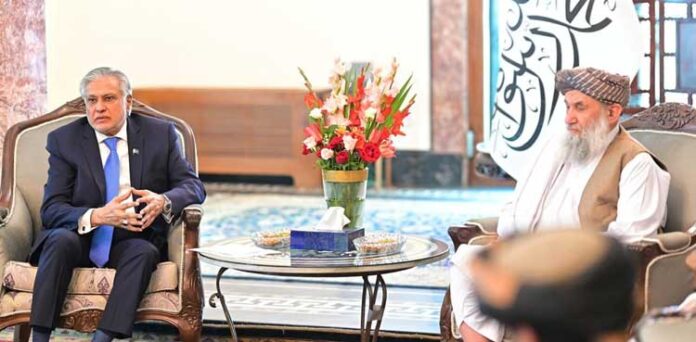By Staff Reporter
ISLAMABAD: Pakistan and Afghanistan pledged on Saturday to prevent militant groups from using their territories for cross-border attacks, marking a potential breakthrough in strained relations during a rare high-level visit by Foreign Minister Ishaq Dar to Kabul.
“We have requested our hosts that we must work together for the development of this region, for its betterment and for establishing peace and stability here,” Dar told reporters in Kabul. “For that, we will not allow our land or our soil to be used by anyone for any wrongful activity inside Afghanistan, and we kindly request you to do the same.”
Dar’s visit, the first by a senior Pakistani official in over a year, comes amid escalating tensions marked by border skirmishes, Pakistan’s mass deportation of Afghan refugees, and a surge in armed attacks within Pakistan since the Taliban’s 2021 takeover.
Islamabad insists groups like the Tehreek-e-Taliban Pakistan (TTP) operate from Afghan soil, though Kabul maintains it does not allow its territory to be used against any nation.
“Both countries must strictly deal with such elements,” Dar continued. “Neither side should allow its territory to be used for any activity against the other, whether it concerns security or terrorism.”
The talks, described by both sides as “constructive,” focused on security cooperation, trade facilitation, and refugee repatriation.
Dar met with acting Afghan Prime Minister Mullah Muhammad Hassan Akhund, Deputy PM Mullah Abdul Salam Hanafi, and Foreign Minister Amir Khan Muttaqi, underscoring what he called “deep-rooted brotherly ties” requiring sustained engagement.
Relations between the neighbors have been fraught since the Taliban’s resurgence, with Pakistan accusing the group of failing to rein in the TTP. Cross-border shelling and Pakistan’s expulsion of over 500,000 Afghan refugees since late 2023 further strained ties. However, recent weeks saw lower-level engagements, including a trade delegation to Islamabad led by Afghan Commerce Minister Nooruddin Azizi, signaling a cautious recalibration.
Dar’s visit, preceded by a meeting of the Pakistan-Afghanistan Joint Coordination Committee in Kabul, reflects Islamabad’s bid to stabilize its western frontier amid economic challenges and regional security concerns.
Before departing, Dar told state media that collaboration with Afghanistan is “vital for regional prosperity,” though he acknowledged “coldness in relations” in recent years.
The two nations agreed to form joint committees to monitor agreements on security, trade, and refugee issues. A timeline for Muttaqi’s reciprocal visit to Pakistan remains undisclosed.
In Kabul, Dar emphasized that security cooperation was “non-negotiable” for regional stability but struck an optimistic tone on economic collaboration.
“Exchange of trade delegations between the two countries is also vital at this stage to increase bilateral trade and ensure mutual prosperity,” he said.
The two sides agreed to operationalize a joint transit tracking system by June 30 to streamline Afghan goods through Pakistan, reduce tariffs, and resolve insurance disputes. Discussions also covered advancing stalled regional projects like the Trans-Afghan Railway and TAPI gas pipeline.
Afghan officials raised concerns over Pakistan’s ongoing expulsion of Afghan refugees, urging Islamabad to halt forced deportations and protect refugees’ rights.
Dar outlined a four-point plan for “dignified repatriation,” including mechanisms to address alleged mistreatment and ensure returnees can transfer property and assets.
Copyright © 2021 Independent Pakistan | All rights reserved




